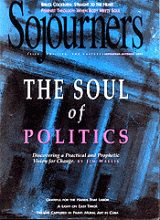Montclair Presbyterian Church in Oakland, California, is taking its concern for the environment seriously. Apparently, the faith and theology emanating from the church is altering the very lifestyles of its 350 congregants in light of the environmental crisis.
The churchs Environmental Policy Guidelines state:
The environmental crisis calls for us to change the way we live. We are becoming increasingly aware that how we eat, move about, procreate, and dispose of waste products are moral and theological issues. Montclair Presbyterian Church and its members have an opportunity to model responsible, just, sustainable, renewable lifestyles.
And model they are. Once environmental policy guidelines were adopted by a church session in December 1990, an "Eco-Steward Committee" created a "Conservation Checklist" for the congregation. The checklist calls church members to take on a long list of lifestyle modifications, including purchasing alternative products, pledging a 10 percent reduction in gas use, composting, gardening organically, carpooling, reducing, reusing, and recycling. Associate Pastor Cynthia Crowner explains that a full 20 percent of the congregation responded to the challenge in 1990 and successfully completed 80 percent of the checklist requirements.
"Since then," Crowner says, "weve extended our commitment to advocate for political change on environmental issues." According to Crowner, participation from congregants on an advocacy level is also very strong. Nearly 60 letters are written to Congress from church members on a given Sunday to advocate against over-development and endangered habitats, and on behalf of legislation such as the Clean Water Act. The Eco-Stewards of Montclair are also putting together a "Shopping Green Handbook" for the congregation, which offers "green" shopping tips in such areas as personal care and clothing, food, cleaning appliances, and garden supplies.
Read the Full Article
